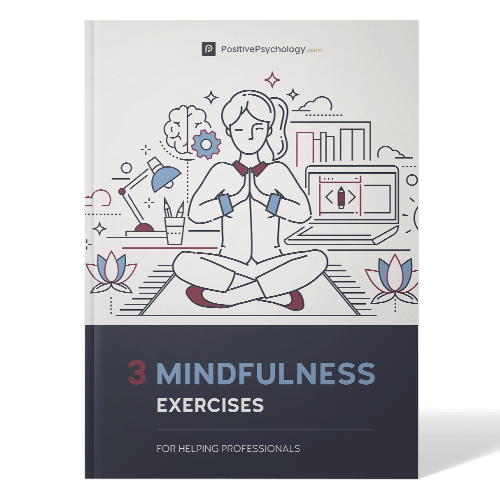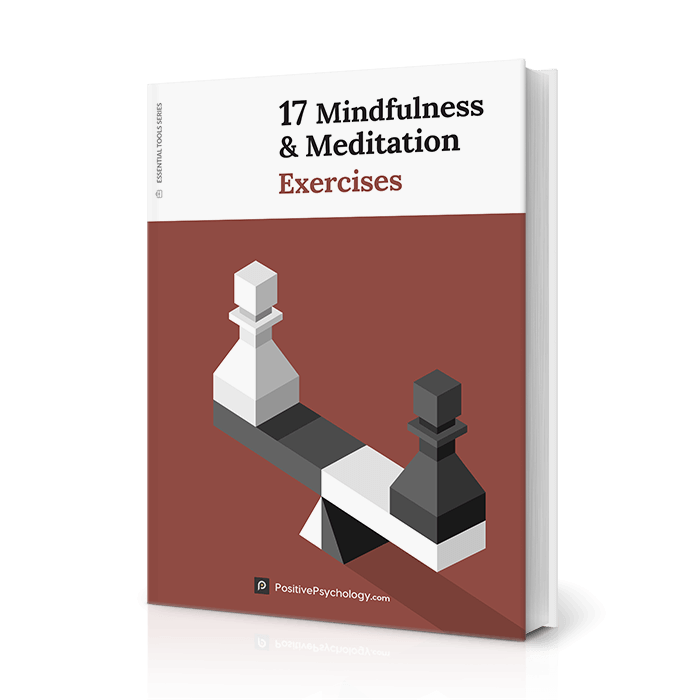Mindful Thinking: 4+ Ways to Stop Ruminating & Overthinking
 Rumination is the unhealthy pattern of behaviors where we continuously think about something that happened in the past, to the point of seeing negative effects on our health and wellbeing.
Rumination is the unhealthy pattern of behaviors where we continuously think about something that happened in the past, to the point of seeing negative effects on our health and wellbeing.
At some point in your life, you may have faced this unhealthy habit or something close to it, worrying obsessively or being stuck in a thought cycle to the point where it affects everything around you.
Today, we will begin by defining rumination and look at how we can stop ruminating:
- During periods of anxiety and depression
- At night
- At work
To counteract these behaviors, we’ll explore some useful techniques, the most effective of which are mindful thinking exercises, meditation, and self-compassion.
Before you continue, we thought you might like to download our three Mindfulness Exercises for free. These science-based, comprehensive exercises will not only help you cultivate a sense of inner peace throughout your daily life, but will also give you the tools to enhance the mindfulness of your clients, students, or employees.
This Article Contains:
- Rumination Defined
- 8 Ways to Stop Ruminating
- Stopping Rumination in Anxiety and Depression
- 4 Helpful Worksheets
- Meditation for Rumination
- Night Rumination and Four Ways to Control It
- 5 Techniques to Stop Overthinking Mistakes
- Controlling Work-Related Overthinking
- PositivePsychology.com’s Mindfulness Resources and Blog Posts
- A Take-Home Message
- References
Rumination Defined
There are a variety of proposed definitions for rumination. For example, Mandell, Siegle, Shutt, Feldmiller, and Thase (2014, p. 35) define rumination as the “tendency to engage in sustained, repetitive thinking about negative topics.”
Nolen-Hoeksema (1991, 2000) expanded the definition to include the consequences of our behavior and feelings, while also narrowing the definition so that it is limited to depression only.
Specifically, Nolen-Hoeksema (1991, p. 569) defines rumination as “repetitively focusing on the fact that one is depressed; on one’s symptoms of depression; and on the causes, meanings, and consequences of depressive symptoms.”
Despite the variations, the definitions converge on the premise that rumination is a repetitive behavior or pattern of thinking, which is often linked to negative feelings or the events that preceded these negative feelings and may extend to include future consequences of these feelings.
Some examples of rumination include:
- When feeling upset about our work performance, we relive these feelings and the thoughts linked to these feelings.
- After arguing with a friend or loved one, we replay the argument repeatedly in our heads and reflect on it.
- After receiving criticism about our work, we may anticipate future remarks directly linked to our feelings about behavior linked to the original criticism.
Although rumination and obsessions both involve repetitive behaviors, they are not the same. Obsessions are often centered around themes of uncleanliness (among others), can present in various forms (e.g., images or thoughts), and are described as intrusive. Rumination, however, is more frequently verbal and linked to behaviors or events in the past (Turner, Beidel, & Stanley, 1992).
The distinction is nuanced but important, especially since anxiety and depression are often comorbid (Clark & Watson, 1991; Brown & Barlow, 1992). A similar distinction is made between worry and rumination. Worry tends to focus on the future, whereas rumination tends to focus on the past.
8 Ways to Stop Ruminating

How does mindfulness combat rumination? The answer is complicated, but here is a summary of some of the ways that mindfulness reduces rumination.
- Mindfulness directs our attention to the present experience. This shift helps us stop ruminating behavior.
- Mindfulness focuses on behaviors such as acceptance, compassion, and openness. These qualities help combat the negative self-evaluations encouraged by rumination.
- Rumination encourages a hyper-vigilant response to negative feelings and psychological states. In contrast, meditation develops awareness about our thinking and psychological states, while also performing a protective role against these states.
In summary, mindfulness strengthens our ability to:
- Shift our attention (i.e., distracts us from rumination)
- Make us aware of our behaviors and thoughts
- Engage with (but not encourage) our distressing thoughts in a nonjudgmental way
With this in mind, we have created a list of techniques to stop rumination. These techniques are a combination of formal and informal techniques used in the Mindfulness Homework Practice Questionnaire (Hawley et al., 2014), as well as mindfulness-based stress reduction (Kabat-Zinn, 2013) and mindfulness-based cognitive therapy (Segal et al., 2013).
First, set aside a regular time for mindfulness exercises. Try to do these exercises at least six days per week. The exercises include:
- Breath awareness – Be aware of your breathing and the feeling of breathing in and out.
- Do a body scan – Scan your body and be aware of how your body feels.
- Practice mindful yoga.
- Practice sitting yoga.
- Perform a regular breathing exercise while you reflect on your feelings and thoughts, and focus on your breathing. This doesn’t have to be a long period; three to five minutes will suffice.
Outside of the regular time that you put aside for mindfulness exercises, also practice the following:
- Be mindful of your routine activities. Be aware of the tasks that you are engaging in and why you’re performing them (e.g., mindful eating).
- Practice mindful walking, where you concentrate on your breathing while walking.
- If you feel stressed out, anxious, or are engaging in rumination behaviors, take a time-out to practice breathing. For three to five minutes, sit somewhere quiet, try to clear your mind, and focus only on your breathing.
If you’re new to mindfulness exercises, it might be challenging to implement these exercises. However, don’t give up! Try to implement these exercises for shorter durations and slowly increase the time until you reach 45–60 minutes.
It will get easier the more you engage in these exercises, and it will lead to reduced rumination. Don’t just focus on the time, though; the quality of the exercises is more important than the quantity (Lloyd, White, Eames, & Crane, 2018).
Stopping Rumination in Anxiety and Depression
Engaging in rumination has a negative effect on both anxiety and depression.
Patients who engage in rumination report higher rates of symptoms of depression, even up to 18 months after the traumatic event about which they ruminate (Nolen-Hoeksema, 2000).
Some patients who ruminate also report that they receive little social support from their friends and family; a possible explanation is that their support system might think that these patients keep on ruminating when they should have ‘made peace’ or recovered from the experience already (Nolen-Hoeksema, 2000).
Besides increasing the risk of depression and reducing social support, rumination also has the following effects on depression (Olatunji, Naragon-Gainey, & Wolitzky-Taylor, 2013):
- Increases feeling of unhappiness
- Impairs problem solving
- Reduces motivation
A meta-analysis of 39 studies (n = 1,140) confirmed the utility and efficacy of therapies that incorporated mindfulness exercises. Respondents with diagnosed anxiety and depression showed a marked improvement in their anxiety and mood symptoms at the end of treatment compared to the beginning (Hofmann, Sawyer, Witt, & Oh, 2010).
The difference in the symptoms at the end of treatment compared to the beginning of treatment was of moderate effect size, and the difference was almost a full standard deviation.
Finally, by engaging in rumination, patients are more vulnerable to relapse of depressive episodes (Nolen-Hoeksema, 2000). For these reasons, it’s particularly important to help patients who experience anxiety and depression to avoid engaging in rumination behaviors.
4 Helpful Worksheets
To help you stop ruminating, we can recommend some worksheets from our PositivePsychology.com library. I have listed them with a short description below.
1. The Raisin Meditation
This mindfulness exercise can be a great introduction to informal mindfulness practice.
2. Alternate Nostril Breathing
The Alternate Nostril Breathing activity is one of the recommended mindfulness exercises and encourages you to breathe consciously for a period of time. This guide will help you implement this technique step by step.
3. The Five Senses Worksheet
Using this exercise, you are made aware of what you see, hear, smell, taste, and feel using your different senses. In this tool, you’ll learn how to cultivate an awareness of the present moment in a non-judgmental way.
4. Yogic breathing
The yogic breathing worksheet will help you relax while developing breath awareness. Breath awareness refers to deep belly breathing (i.e., diaphragmatic breathing), which is a useful tool for reducing rumination.
Two things you can do to stop ruminating – Dr. Tracey Marks
Meditation for Rumination
Meditation is a regular (preferably daily) practice where one practices nonjudgmental awareness of their breathing, feelings, thoughts, and bodily states.
Of the extant research investigating the effect of meditation on rumination, the majority of studies have used interventions with mindful meditation (Campbell, Labelle, Bacon, Faris, & Carlson, 2011).
Through this type of meditation, we can develop mindfulness, which is a useful tool for combatting rumination (Campbell et al., 2011). Meditation has also been shown to reduce symptoms of depression and rumination in patients diagnosed with cancer (Zainal, Booth, & Huppert, 2013) and high blood pressure (Campbell et al., 2011).
Other novel methods can be used to combat rumination through meditation through the addition of aerobic exercise. Alderman, Olson, Brush, and Shors (2016) recruited two groups of patients: one group of ‘healthy’ patients and another group with clinically diagnosed depression. Both groups participated in meditation exercises where they performed sitting meditation, then walking meditation, followed by a medium-intensity cardiovascular exercise for 30 minutes (e.g., running).
Participants performed these tasks for eight weeks. After eight weeks, Alderman et al. (2016) found that both groups of participants reported fewer symptoms of clinical depression compared to when they started the program (up to 40% less). Furthermore, both groups said that they had fewer symptoms of rumination at the end compared to the start of the program.
The positive changes from the program were not limited to only self-report measures of rumination. The depressed group also showed marked improvement in neural activity for markers linked to conflict monitoring and cognitive control to such an extent that their neural activity started to resemble that of the healthy group.
These results suggest that meditation (combined with physical exercise) reduces rumination behaviors while increasing neural activity that allows for better conflict monitoring and cognitive control.
We should mention that the researchers didn’t include a group who participated in only meditation or only in exercise. Hence, it is not clear what effects meditation and exercise have on reducing rumination separately. However, these results are promising.
Night Rumination and Four Ways to Control It

Additionally, rumination delays the objective and subjective onset of sleep (Zoccola, Dickerson, & Lam, 2009).
Poor sleep quality increases the likelihood of developing depression and is also linked to other diseases such as diabetes (Âkerstedt, 2006). Furthermore, once aware of the rumination, we may develop anxiety about the sleeplessness (e.g., “When will I fall asleep?”; “I have a meeting tomorrow, and I need to sleep”; Jansson & Linton, 2007). These concerns feed into a negative cycle where we ruminate on our worries, anxiety, and inability to sleep, which further increases our cognitive arousal.
Rumination is a form of cognitive arousal, and some tasks will arouse you further. Additionally, using electronic devices will expose you to bright light, which can reduce melatonin (the hormone that makes you feel sleepy).
Therefore, to improve sleep hygiene we discourage any of the following before bed:
- Reading on your smartphone
- Watching television
- Working
- Suppressing your worries – Thought suppression has the undesired boomerang effect of increasing cognitive arousal (Harvey & Greenall, 2003).
If you find that you ruminate at night, some of the following techniques may help:
- Distract yourself with a relaxing task (e.g., reading a book)
- Leave the bedroom and go somewhere quiet to meditate.
- Do a three-minute breathing exercise.
- Do a body scan.
- Do some light mindful yoga or stretching.
5 Techniques to Stop Overthinking Mistakes
Rumination is not only linked to work, depression, or anxiety. People who place a high value on perfectionism or who score highly on perfectionism traits are also likely to engage in rumination (Flett, Nepon, & Hewitt, 2016; van der Kaap-Deeder et al., 2016; Nepon, Flett, Hewitt, & Molnar, 2011).
Some perfectionists are especially concerned with evaluation, set unattainable goals, and experience self-doubt and low confidence. When perfectionists ‘fail’ at a task, they may tend to ruminate over their mistakes, which in turn heightens the negative feelings that they experience.
To counteract ruminating about past mistakes, instead engage in the following behaviors (Barnard & Curry, 2011; van der Kaap-Deeder et al., 2016):
- Recognize that your self-worth is not contingent on your successes or failures.
- Practice self-compassion:
- Be kind to yourself.
- Accept yourself unconditionally.
- Recognize that your failures make you human and allow you to connect with other people.
- Engage in mindfulness when you realize that you are being judgmental or negative about yourself.
Controlling Work-Related Overthinking

- It is very demanding.
- It has few opportunities for decision making.
- Workers have little control over how the work must be performed.
One way in which work-related stress manifests is by workers not being able to ‘relax’ after work (Cropley & Purvis, 2003). This is a common occurrence that all of us have experienced at some stage in our lives. After completing a day of work, we remain in ‘work-mode,’ and we’re not able to ‘shut off’ our work mindset. Sometimes, occupational stress can also result in rumination (Cropley & Purvis, 2003) or worry at nighttime (Rodríguez-Muñoz, Notelaers, & Moreno-Jiménez, 2011).
So how can we combat work-related overthinking? Some of the techniques that we have already outlined in this post may help; for example:
- Meditation
- Body scan
- Breathing exercises
- Mindful yoga and stretching
Make sure to carve out time for these exercises every day, preferably after you have come home from work so that you have a clear break between work and home life.
Another tool that might help is to identify what is triggering your rumination behavior at work. However, make sure that by developing awareness and recognizing the trigger, you do not end up ruminating over it. Your goal is to practice mindful awareness, where you identify the feelings and thoughts, but do not judge them.
PositivePsychology.com’s Mindfulness Resources and Blog Posts
We have several excellent resources regarding mindfulness and mindful thinking. Have a look at the following:
1. From our worksheet library
Clinicians can find numerous mindfulness resources in our worksheet library. If you work with clients who want a better way to manage panic attacks, then begin with our STOP the Panic exercise. This worksheet can be printed and carried around.
Once you have introduced your clients to some basic mindfulness resources, you might want to help them develop it further. In addition to the tools already recommended here, try our Workplace Mindfulness resource, with which clients can learn how to decrease stress and improve workplace satisfaction through a series of simple questions.
2. From our blog
Readers interested in meditation can read more in the following posts:
- 65+ Mindfulness Worksheets for Adults, Kids, and Your Therapy Sessions
- 28 Best Meditation Techniques for Beginners to Learn
- 30 Meditation Exercises and Activities to Practice Today
- Mindfulness Meditation Videos, Exercises, Books, and Courses (+PDF)
Readers who are interested in reading more about self-compassion and acceptance are referred to the following posts:
- How to Build Self-Acceptance: 16 Tips, Activities & Exercises
- The Self-Compassion Scale and Test (incl. PDF)
- 12 Best Compassion Training Exercises & Activities
- What Is Self-Acceptance? 25 Exercises + Definition and Quotes
3. From our courses
The Mindfulness-X Masterclass is a complete mindfulness training package for practitioners. If you find that mindfulness is a life-changing solution to stop rumination and wish to teach others the benefits, this course is for you.
4. 17 Mindfulness & Meditation Exercises
If you’re looking for more science-based ways to help others enjoy the benefits of mindfulness, this collection contains 17 validated mindfulness tools for practitioners. Use them to help others reduce stress and create positive shifts in their mental, physical, and emotional health.
A Take-Home Message
Rumination is a negative thinking process where we repeatedly reflect and think about past behaviors, and it can increase the severity of anxiety and depression symptoms.
Rumination does not discriminate and can manifest in people with anxiety, depression, overworked, or high perfectionist tendencies. One of the most effective ways to combat rumination is through mindful-based therapies and exercises. Mindful exercises also help combat the underlying conditions of which rumination is a symptom (including anxiety and perfectionism).
The benefit of mindfulness exercises is that client learns to distract themselves from the ruminating behavior by shifting their behaviors, becoming aware of their actions and thoughts, and engaging with (but not encouraging) their behaviors and thoughts in a nonjudgmental way.
We hope you found this article useful. Don’t forget to download our three Mindfulness Exercises for free.
- Âkerstedt, T. (2006) Psychosocial stress and impaired sleep. Scandinavian Journal of Work, Environment & Health, 32(6), 493–501.
- Alderman, B., Olson, R., Brush, C., & Shors, T. J. (2016). MAP training: Combining meditation and aerobic exercise reduces depression and rumination while enhancing synchronized brain activity. Translational Psychiatry, 6(e726), 1–9.
- Barnard, L. K., & Curry, J. F. (2011). Self-compassion: Conceptualizations, correlates, & interventions. Review of General Psychology, 15, 289–303.
- Brown, T. A., & Barlow, D. H. (1992). Comorbidity among anxiety disorders: Implications for treatment and DSM-IV. Journal of Consulting and Clinical Psychology, 60(6), 835–844.
- Campbell, T. S., Labelle, L. E., Bacon, S. L., Faris, P., & Carlson, L. E. (2012). Impact of mindfulness-based stress reduction (MBSR) on attention, rumination, and resting blood pressure in women with cancer: A waitlist-controlled study. Journal of Behavioral Medicine, 35(3), 262–271.
- Clark, L. A., & Watson, D. (1991). Tripartite model of anxiety and depression: psychometric evidence and taxonomic implications. Journal of Abnormal Psychology, 100(3), 316–336.
- Cropley, M., & Purvis, L. J. M. (2003). Job strain and rumination about work issues during leisure time: A diary study. European Journal of Work and Organizational Psychology, 12(3), 195–207.
- Flett, G. L., Nepon, T., & Hewitt, P. L. (2016). Perfectionism, worry, and rumination in health and mental health: A review and a conceptual framework for a cognitive theory of perfectionism. In F. M. Sirois & D. S. Molnar (Eds.), Perfectionism, health, and well-being (pp. 121–155). Springer.
- Harvey, A. G., & Greenall, E. (2003). Catastrophic worry in primary insomnia. Journal of Behavior Therapy and Experimental Psychiatry, 34(1), 11–23.
- Hawley, L. L., Schwartz, D., Bieling, P. J., Irving, J., Corcoran, K., Farb, N. A., … Segal, Z. V. (2014). Mindfulness practice, rumination, and clinical outcome in mindfulness-based treatment. Cognitive Therapy and Research, 38(1), 1–9.
- Hofmann, S. G., Sawyer, A. T., Witt, A. A., & Oh, D. (2010). The effect of mindfulness-based therapy on anxiety and depression: A meta-analytic review. Journal of Consulting and Clinical Psychology, 78(2), 169–183.
- Jansson, M., & Linton, S. J. (2007). Psychological mechanisms in the maintenance of insomnia: Arousal, distress, and sleep-related beliefs. Behaviour Research and Therapy, 45(3), 511–521.
- Kabat-Zinn, J. (2013). Full catastrophe living: Using the wisdom of your body and mind to face stress, pain and illness. Bantam Books.
- Karasek, R. A., & Theorell, T. (1990). Healthy work: Stress, productivity, and the reconstruction of working life. Basic Books.
- Lloyd, A., White, R., Eames, C., & Crane, R. (2018). The utility of home-practice in mindfulness-based group interventions: A systematic review. Mindfulness, 9(3), 673–692.
- Mandell, D., Siegle, G. J., Shutt, L., Feldmiller, J., & Thase, M. E. (2014). Neural substrates of trait ruminations in depression. Journal of Abnormal Psychology, 123(1), 35–48.
- Nepon, T., Flett, G. L., Hewitt, P. L., & Molnar, D. S. (2011). Perfectionism, negative social feedback, and interpersonal rumination in depression and social anxiety. Canadian Journal of Behavioural Science/Revue Canadienne des Sciences du Comportement, 43(4), 297–308.
- Nolen-Hoeksema, S. (1991). Responses to depression and their effects on the duration of depressive episodes. Journal of Abnormal Psychology, 100(4), 569–582.
- Nolen-Hoeksema, S. (2000). The role of rumination in depressive disorders and mixed anxiety/depressive symptoms. Journal of Abnormal Psychology, 109(3), 504–511.
- Olatunji, B. O., Naragon-Gainey, K., & Wolitzky-Taylor, K. B. (2013). Specificity of rumination in anxiety and depression: A multimodal meta-analysis. Clinical Psychology: Science and Practice, 20(3), 225–257.
- Rodriguez-Muñoz, A., Notelaers, G., & Moreno-Jimenez, B. (2011). Workplace bullying and sleep quality: The mediating role of worry and need for recovery. Psicología Conductual, 19(2), 453–468.
- Segal, Z. V., Williams, J. M. G., & Teasdale, J. D. (2013). Mindfulness-based cognitive therapy for depression: A new approach to preventing relapse (2nd ed.). Guilford Press.
- Thomsen, D. K., Mehlsen, M. Y., Christensen, S., & Zachariae, R. (2003). Rumination—Relationship with negative mood and sleep quality. Personality and Individual Differences, 34(7), 1293–1301.
- Turner, S. M., Beidel, D. C., & Stanley, M. A. (1992). Are obsessional thoughts and worry different cognitive phenomena? Clinical Psychology Review, 12(2), 257–270.
- Van der Kaap-Deeder, J., Soenens, B., Boone, L., Vandenkerckhove, B., Stemgée, E., & Vansteenkiste, M. (2016). Evaluative concerns perfectionism and coping with failure: Effects on rumination, avoidance, and acceptance. Personality and Individual Differences, 101, 114–119.
- Zainal, N. Z., Booth, S., & Huppert, F. A. (2013). The efficacy of mindfulness-based stress reduction on mental health of breast cancer patients: A meta-analysis. Psycho-Oncology, 22(7), 1457–1465.
- Zoccola, P. M., Dickerson, S. S., & Lam, S. (2009). Rumination predicts longer sleep onset latency after an acute psychosocial stressor. Psychosomatic Medicine, 71(7), 771–775.
Let us know your thoughts
Read other articles by their category
- Body & Brain (49)
- Coaching & Application (57)
- Compassion (26)
- Counseling (51)
- Emotional Intelligence (24)
- Gratitude (18)
- Grief & Bereavement (21)
- Happiness & SWB (40)
- Meaning & Values (26)
- Meditation (20)
- Mindfulness (45)
- Motivation & Goals (45)
- Optimism & Mindset (34)
- Positive CBT (28)
- Positive Communication (20)
- Positive Education (47)
- Positive Emotions (32)
- Positive Leadership (18)
- Positive Parenting (4)
- Positive Psychology (33)
- Positive Workplace (37)
- Productivity (16)
- Relationships (46)
- Resilience & Coping (36)
- Self Awareness (21)
- Self Esteem (38)
- Strengths & Virtues (32)
- Stress & Burnout Prevention (34)
- Theory & Books (46)
- Therapy Exercises (37)
- Types of Therapy (64)





What our readers think
Where in this article is the free meditation please? Thank you!
Hi Kathy,
Take a look at the links under the subheading ‘PositivePsychology.com’s Mindfulness Resources and Blog Posts’, and particularly ‘2. From our blog’. There, you’ll find links to several other blog posts that contain free meditations and mindfulness resources.
Hope this helps!
– Nicole | Community Manager
I was in deep admiration about your subject and the art of presenting very subtle corner of the topic. Thank you for sharing with us ..
Armine Abelyan